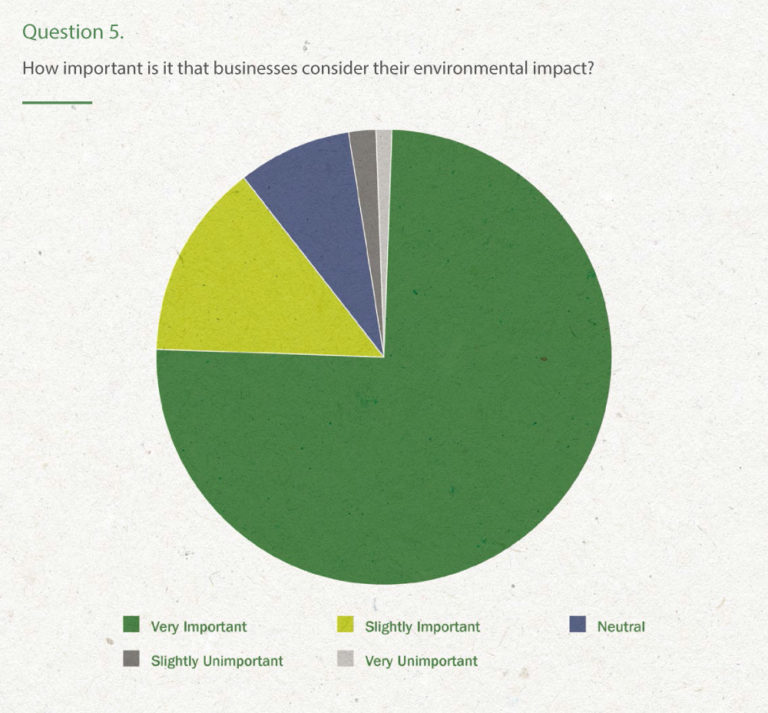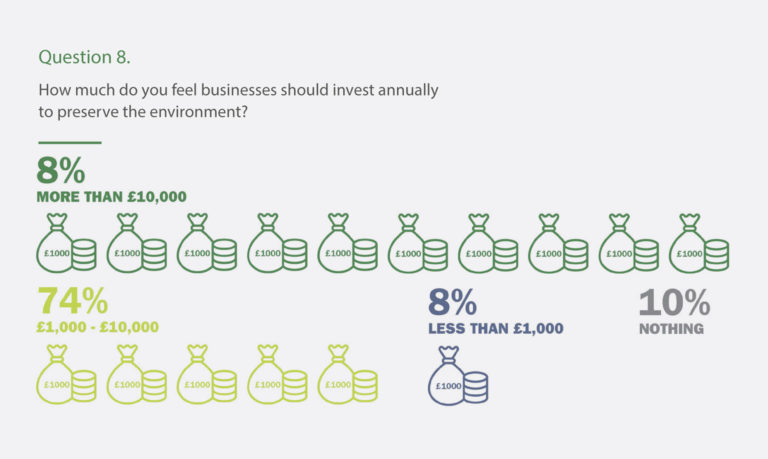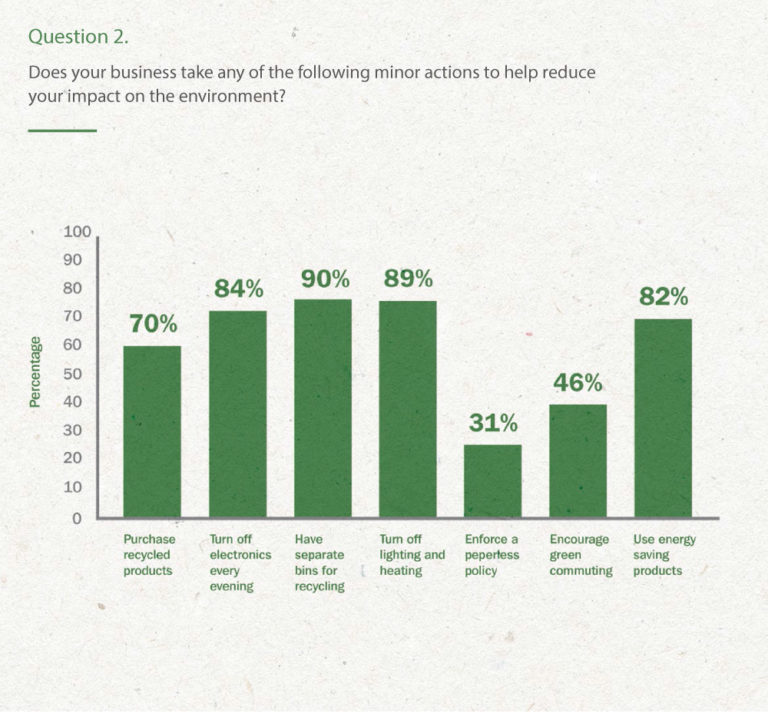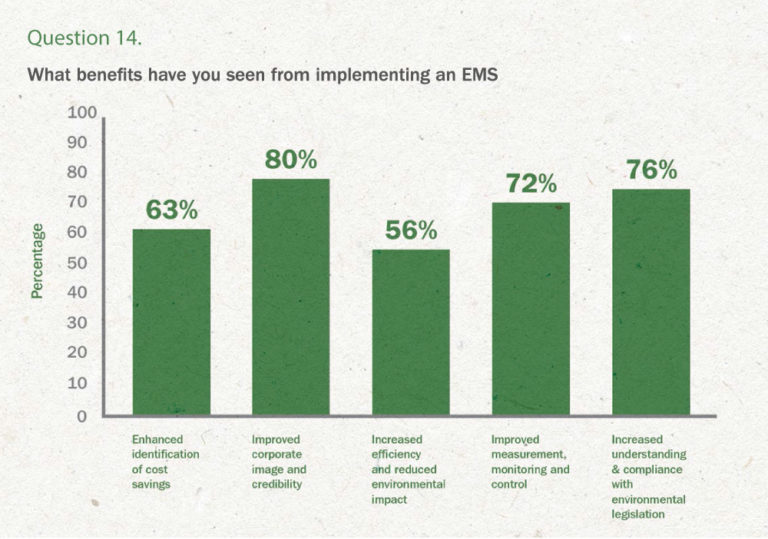Environment Report
Reduce, reuse and recycle
Business responses to climate change
As the earth’s temperature increases so does the pressure on businesses to work more sustainably. But what actions are businesses taking? And what are their attitudes towards it? To find out, we went and asked them. Here is a summary of what we found.

The year 2019 was something of a watershed in the fight for environmental sustainability
Thanks to Extinction Rebellion protests and the impassioned pleas of Greta Thunburg, the environment was never far from the news.
As a result, there have been increasing calls for action, spurring more of us to recycle our rubbish, switch to more renewable energy suppliers and ditch fast fashion. And now there is a strong voice from both campaigners and businesses for a net-zero pledge to be agreed at the 2020 UN climate change summit in Glasgow.
With this in mind, QMS set out to feel the pulse of SMEs on the issue of environmental sustainability, discover what they are doing to improve it and their barriers to success.

THE IMPORTANCE OF SUSTAINABILITY
As expected, the vast majority of respondents placed huge importance on the issue of environmental sustainability, with only 10% saying that it was the least important factor to their business. Indeed, its importance has even overtaken that of customer satisfaction.
However, the largest proportion of those who downplayed its importance was from the engineering and energy/natural resources industries, a disconcerting finding when their sizeable carbon footprints are taken into consideration.
When asked about how important it is that their business considers their environmental impact, similar industries were also lukewarm. The majority of those who answered ‘slightly unimportant’ or ‘neutral’ were in the engineering, construction, manufacturing and IT sectors.
Our results also showed a broad trend that linked larger business sizes with a greater emphasis on environmental action, suggesting that smaller businesses may be dismissing how valuable their contribution could be towards greater sustainability and a healthier planet.

NECESSITY AND INVESTMENT
The results for how realistic environmental goals are perceived to be was encouraging, with only 7% of respondents taking a more pessimistic view and stating that they were unachievable. Of these, it is perhaps unsurprising that 50% were in the construction sector, 30% in engineering, 10% in manufacturing and 10% in IT, industries that typically have a high impact on the environment.
Conversely (and controversially), these industries also made up the 10% of respondents who did not think any investment in environmental sustainability was necessary.
Of the remainder, the vast majority (74%) felt that an annual investment between £1,000 and £10,000 should be made to boost their environmental sustainability, but views diverged when it came to justify that amount, with some respondents saying it should be based on business size and turnover while others argued that it should be linked to the business’ environmental impact. The research revealed a particular disconnect between larger organisations, which seemed to feel that they had a responsibility to invest, and smaller businesses that felt investment was unnecessary if they were “not causing the problem”.

CURRENT ACTION PLANS
Overall, there were encouraging answers from respondents on their actions to improve environmental sustainability.
Introducing recycling bins and promoting recycling was by far the most popular action, particularly in organisations with fewer than 55 employees. In total, 90% of respondents now have separate bins for recycling, with another 70% purchasing recycled products. Introducing a company-wide ‘switch off’ was also popular, especially among larger companies, with 84% of respondents turning off their electrical equipment every night and another 89% turning off all their lighting and heating each evening. Paperless policies have also been introduced by 31% of respondents while 46% have begun to encourage green commuting.
Larger actions have also been taken:
- 37% now use renewable energy
- 41% consider sustainable construction if building is necessary
- 61% have taken steps to reduce their use of natural resources
Other steps included purchasing electric cars, holding virtual meetings and investing in more economical machinery. Some respondents have also aligned themselves with official bodies, such as Forest Carbon, to support greater sustainability.

ENVIRONMENTAL MANAGEMENT SYSTEMS
Environmental Management Systems (such as ISO 14001) were also mentioned by respondents, although it was interesting to discover that 20% of respondents with a system were not motivated by the opportunity to prevent pollution or limit climate change.
However, it is evident that many respondents found that having an Environmental Management System in place had helped towards their sustainable goals, with 61% saying it had improved their ability to measure, monitor and control their ongoing environmental impact and 48% stating that it has increased their efficiency and reduced the environmental impact across their products’ life cycle.
Another 63% also said that it had helped their understanding of environmental legislation. This is a key benefit, particularly as the research found that 35% of respondents within the IT sector were slightly unaware of not aware of one or more areas of legal responsibility, with 16%, 14% and 8% of respondents within the manufacturing, construction and engineering sectors respectively also having little to no awareness in one or more areas.

EFFECTS OF LOCKDOWN
“ISO 14001 isn’t just about box-ticking to win business, though. For us it has been a practical foundation for a culturally important element of how our organisation is run.”
TerraDat, Operations Manager and Principal Geologist, Simon Hughes
These plans have also had other persuasive benefits. Of those with a plan, 66% said it had given their corporate image a boost and another 53% said that it had led to the identification of cost savings.

TACTICS OVER STRATEGY
These responses revealed that businesses are overwhelmingly taking a more tactical approach when it comes to improving their business’ sustainability, seeing it as a ‘goal’ that can be achieved rather than a continual process of improvement.
In order to ensure that a business can meet ever-changing legislative and regulatory benchmarks, it is important that environmental sustainability is enshrined within business aims and strategy. This means it is less likely to be compromised by other goals and that the business is taking a long-term view.
Environmental Management Systems can certainly help to put a strategy in place, but our research uncovered several potential barriers to getting one.
-
18% thought that the timing was wrong for their business
-
15% considered it to be too expensive
-
15% did not see it as a worthwhile investment
-
12% believed it was too time consuming
-
8% lacked information
-
4% hadn’t been convinced by reviews
-
4% were unable to convince others to go forward with a system
-
4% were unaware of Environmental Management Systems altogether
This suggests that more education on Environmental Management Systems is required, with its benefits towards cost savings, compliance and positive brand association being highlighted. After all, our research found that of those who do have a plan, 90% considered it to have been a good financial investment.
IMPROVE YOUR ENVIRONMENTAL SUSTAINABILITY
Overall, our report’s results show that there is plenty that businesses can do to lessen their impact on the environment and improve sustainability, and it is evident that many respondents have found an Environmental Management Plan to be an ideal way to do it.
ISO 14001 is one such plan offered by us – a global standard that can help your business to comply with changing environmental laws and regulations and reduce its impact on the environment.
If you want to find out more about ISO 14001 and what we can do to help your business achieve it, head over to our dedicated webpage or get a free quote with our calculator.

